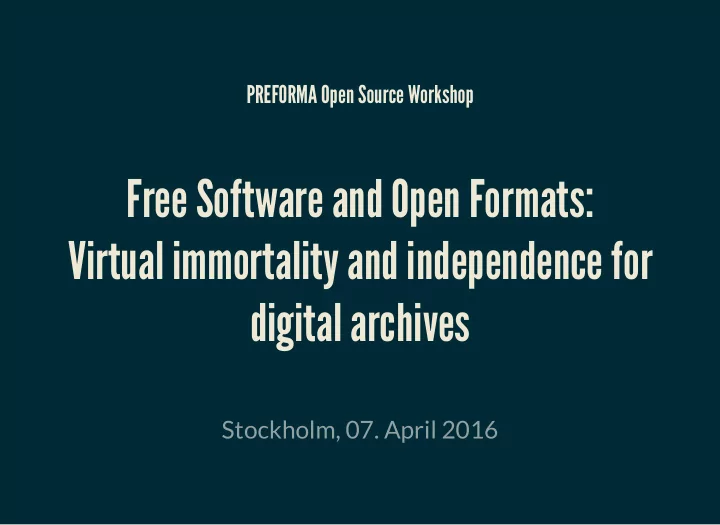

PREFORMA Open Source Workshop Free Software and Open Formats: Virtual immortality and independence for digital archives Stockholm, 07. April 2016
Hello ;-)
Well, what actually is "Open Source"? Common misassumptions: Open Source = Freeware Must be non-commercial Is nerdy and non-user friendly This strange "Lunax" system...? So Open Source is actually about YOUR user freedom ...
Free Software Free as in free speech! I will use the term "Free Software" to clarify it's about user freedom. FOSS = Free and Open Source Software.
Free Software Defined by "The 4 Freedoms" The right to: USE it for any purpose STUDY how the program works and understand it SHARE copies of the software IMPROVE the program and distribute these changes FOSS is defined by providing the user at least 4 digital freedoms.
So what? Benefits for long-term preservation? Let's look at it in detail...
How long is "long term"? 10 years? 100 years? longer? or: 3-5 years? = market-lifetime of software
Let's define "long term" for preservation/archiving as = Infinity! :)
+1 Just to be sure, let's add one day ;) Longterm = Infinity + 1 day
Virtual Immortality? Archive your replayer Including schematics Building components Exchange it with others Make it work under future condititions Free Software allows you this, by license definition. Irrevocably = for infinity. This counteracts issues of tool/format obsolescence.
Why isn't it more widely used or known in archival domains? Sounds too good to be true. So why is the norm software still proprietary in archiving?
It's a chickeneggproblem : Vendors don't offer FOSS, because customers/archives don't request FOSS. Archives don't request FOSS, because vendors don't offer FOSS.
Perceived professionalism and quality Price = quality? GUI = quality? Professionals not using it? Ongoing support? Responsibilities? "Professionals" often consider brand and price as an indicator for quality. This is why "free" is often mistakenly thought to be "unprofessional" or of lower quality. With these doubts, and because "noone has ever done this before..." , archives currently rather stay with proprietary products. Usability concerns or lack of: GUI, ease of install, support, etc. Understandable but this can be improved.
Price = Quality? You can get buggy software under all licenses: proprietary and free. And within any price-range ;) In other areas, Free Software already has its status as a professional standard (Webserver, Networking, Programming, ...)
Price = Quality? Quality of software is price- and license-independent. This should always be kept in mind when dealing with software. Also the fact that "just because everybody else is using it" doesn't mean it's good (for you).
Professional vs. Free? Professionals don't use Free Software...? BBC: Dirac: http://diracvideo.org/ Ingex: http://ingex.sourceforge.net/ and many more: http://www.bbc.co.uk/opensource/projects/ GlusterFS : Used for Hollywood movies Open EXR : Developed and used by "Industrial Light & Magic" And GNU/Linux (which also powers the Internet) of course ;)
Independence?
The archival domain Relatively small market (niche) Off-the-shelf products often focus on different use cases Highly specialized demands High potential for vendor dependence...
With Free Software Reusability of existing solutions Free choice of (local) support/suppliers No black-box Common tools/codebase = larger userbase Less "forced" upgrades
The next step: Professionalization of Free Software
Paying for Free Software: The best of both worlds Currently, funding goes to vendors who do not offer you choice/freedom. Is it in your interest to fund entities that profit from your dependence, lockin and blackboxes you can't control?
Paying for Free Software Benefits: Better support/updates Pooling resources Improvements available "upstream" Designed for your use-cases Overall better cost-effectiveness Public money = public solutions FOSS offers you freedom and control over your techenvironment. If you don't support FOSS with resources, you will lose these freedoms/control because: Who should offer it to you, then?
Professionalizing Free Software: How? Make support contracts Paid installation/integration Hire developers Non-financial contributions: Documentation Testing / bug-reports Helping others If you like a FOSS tool especially if you use it at work: Consider paying at least some amount. It will keep the project healthy and you profit from that.
Professionalizing Free Software: Whom to ask? Open Preservation Foundation Free Software Foundation Europe ( FSFE ) Maintainer of FOSS-project of your interest Companies that support/develop Free Software
Professionalizing Free Software: A real-world example
The lossless video codec FFV1
How it all began... Austrian National Archive (Mediathek) wanted to do lossless digital video archiving Not satisfied with existing products (Interoperability issues) Found FFV1 in FFmpeg Excellent codec, but we wanted/needed more...
How we used the "4 freedoms"... Contacted and hired FFV1 maintainer Michael Niedermayer Other parties involved (pooled resources) Budget calculated in reference to costs of proprietary alternatives Had FFV1 improvements in progress...
How it continued... FFmpeg forked: LibAV Patches then submitted to LibAV, too FFV1.3: faster and integrity-aware Important: Published our experiences with FFV1 So: Other archives using FFV1 now profit from improvements, too!
PREFORMA's role Upcoming conformance/policy checker Standardization of FFV1/MKV Increased credibility of these formats Reduced skepsis of users/vendors Encouraging similar projects in the future
A growing Free Software ecosystem for long-term preservation VeraPDF DPF Manager MediaInfo MediaConch , JHOVE DROID VLC FFmpeg LibAV / SoX ImageMagick , Archivematica CollectiveAccess DVA-Profession AnyArk QCTools dvdisaster and many more... Growing ecosystem for professional archiving with FOSS
Collaboration welcome We archives have: Common interests. Common challenges. Common solutions? We all profit from investing in FOSS solutions. FOSS allows pooling resources. FFV1 just one example for what is possible.
- Fin -
About myself Peter Bubestinger-Steindl (p.bubestinger@das-werkstatt.com) Studied Media Computer Science at the TU Vienna Developer and Tech-Consultant since 2000 Hands-on experience with archives since 2002: Austrian Mediathek University of Notre Dame Archives The National Archives U.K. ORF (National broadcaster, Austria) VoV (National broadcaster, Vietnam) RTV (National broadcaster, Slovenia) SRTC (National broadcaster, Sudan) Fonoteca Nacional (Mexico) Memnon Archiving Services (Belgium) SRF (Sweden), YLE (Finland), SRR (Romania), ...
License and Credits This presentation is available under a Free License: “ Creative Commons "Attribution-ShareAlike" ( CC-BY-SA ) ” Peter Bubestinger-Steindl ( p.bubestinger@das-werkstatt.com )
Recommend
More recommend